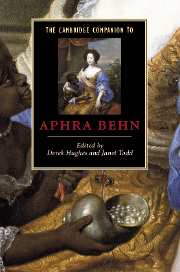Book contents
- Frontmatter
- 1 Aphra Behn: The Documentary Record
- 2 Behn, women, and society
- 3 Aphra Behn and the Restoration theatre
- 4 The political poetry of Aphra Behn
- 5 Behn’s dramatic response to Restoration politics
- 6 Tragedy and tragicomedy
- 7 Behn and the unstable traditions of social comedy
- 8 The Cavalier myth in The Rover
- 9 ‘The story of the heart’: Love-letters between a Noble-Man and his Sister
- 10 Oroonoko: reception, ideology, and narrative strategy
- 11 ‘Others’, slaves, and colonists in Oroonoko
- 12 The short fiction (excluding Oroonoko)
- 13 Pastoral and lyric: Astrea in Arcadia
- 14 Aphra Behn’s French translations
- Further reading
- Index
- Series list
9 - ‘The story of the heart’: Love-letters between a Noble-Man and his Sister
Published online by Cambridge University Press: 28 May 2006
- Frontmatter
- 1 Aphra Behn: The Documentary Record
- 2 Behn, women, and society
- 3 Aphra Behn and the Restoration theatre
- 4 The political poetry of Aphra Behn
- 5 Behn’s dramatic response to Restoration politics
- 6 Tragedy and tragicomedy
- 7 Behn and the unstable traditions of social comedy
- 8 The Cavalier myth in The Rover
- 9 ‘The story of the heart’: Love-letters between a Noble-Man and his Sister
- 10 Oroonoko: reception, ideology, and narrative strategy
- 11 ‘Others’, slaves, and colonists in Oroonoko
- 12 The short fiction (excluding Oroonoko)
- 13 Pastoral and lyric: Astrea in Arcadia
- 14 Aphra Behn’s French translations
- Further reading
- Index
- Series list
Summary
In the final stanza of Aphra Behn's pastoral poem, 'The Golden Age', the authenticity, integrity, and moral credit of the poem's nostalgic idealism is radically undermined by revealing the interest of its speaker:
But Sylvia when your Beauties fade,
When the fresh Roses on your Cheeks shall die,
Like Flowers that wither in the Shade,
Eternally they will forgotten lye,
And no kind Spring their sweetness will supply.
When Snow shall on those lovely Tresses lye
And your fair Eyes no more shall give us pain,
But shoot their pointless Darts in vain.
What will your duller honour signifie?
Go boast it then! and see what numerous Store
Of Lovers, will your Ruin'd Shrine Adore.
Then let us Sylvia yet be wise,
And the Gay hasty minutes prize:
The Sun and Spring receive but one short Light, /Once sett, a sleep brings an Eternal Night.
(i, p. 35)The ideal of the economy of the ‘gift’, the language of pastoral ‘liberty’, is a ploy to get something for nothing. And the name Sylvia encourages us to connect this beloved with the beleaguered heroine Behn was writing about at the same time (‘The Golden Age’ was published in her Poems Upon Several Occasions of 1684), the recipient of the urgent love letters from her sister’s husband, who uses the precedent of the ‘golden age’ to seduce her into giving him the final favour as a gift to cement their love.
- Type
- Chapter
- Information
- The Cambridge Companion to Aphra Behn , pp. 135 - 150Publisher: Cambridge University PressPrint publication year: 2004



